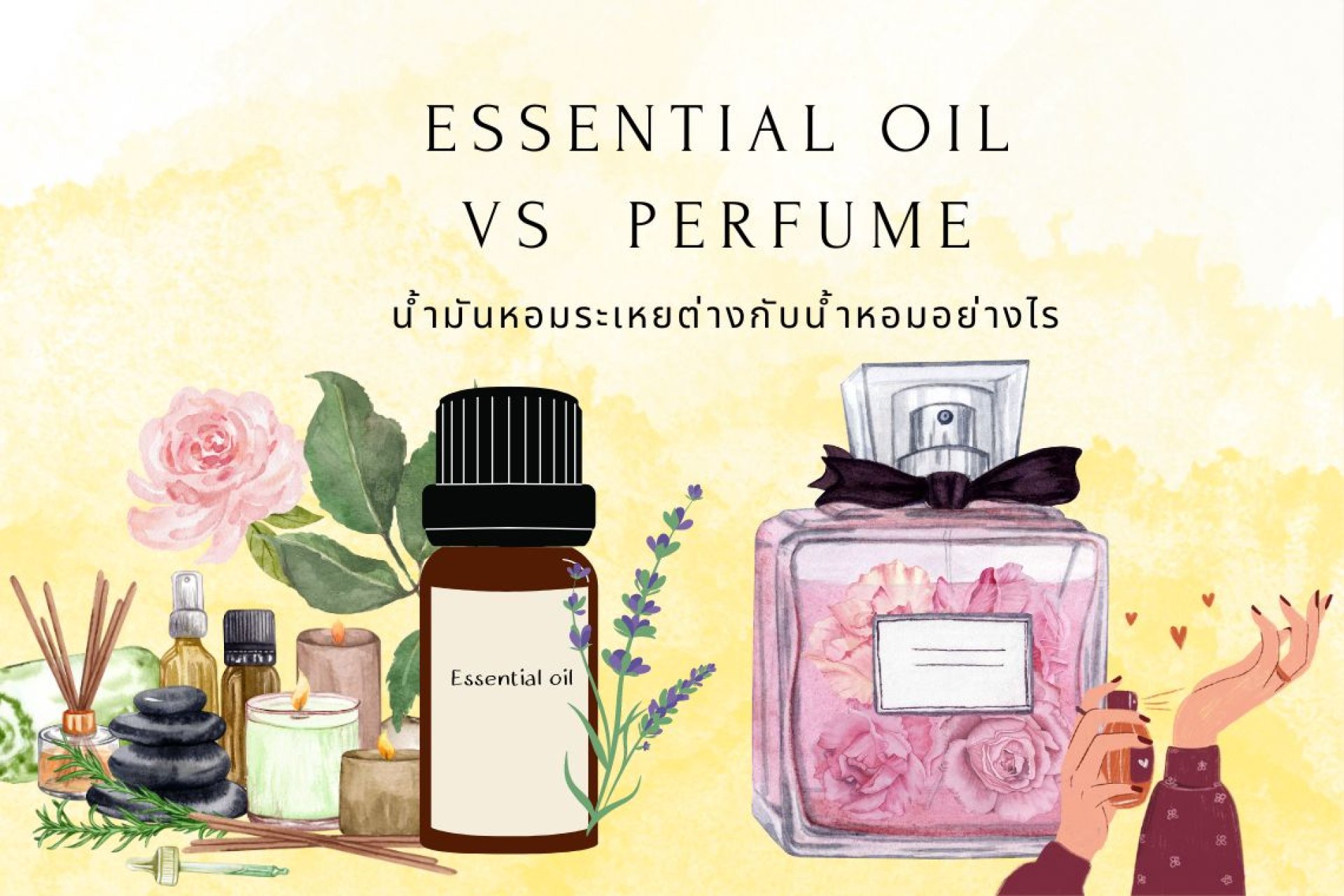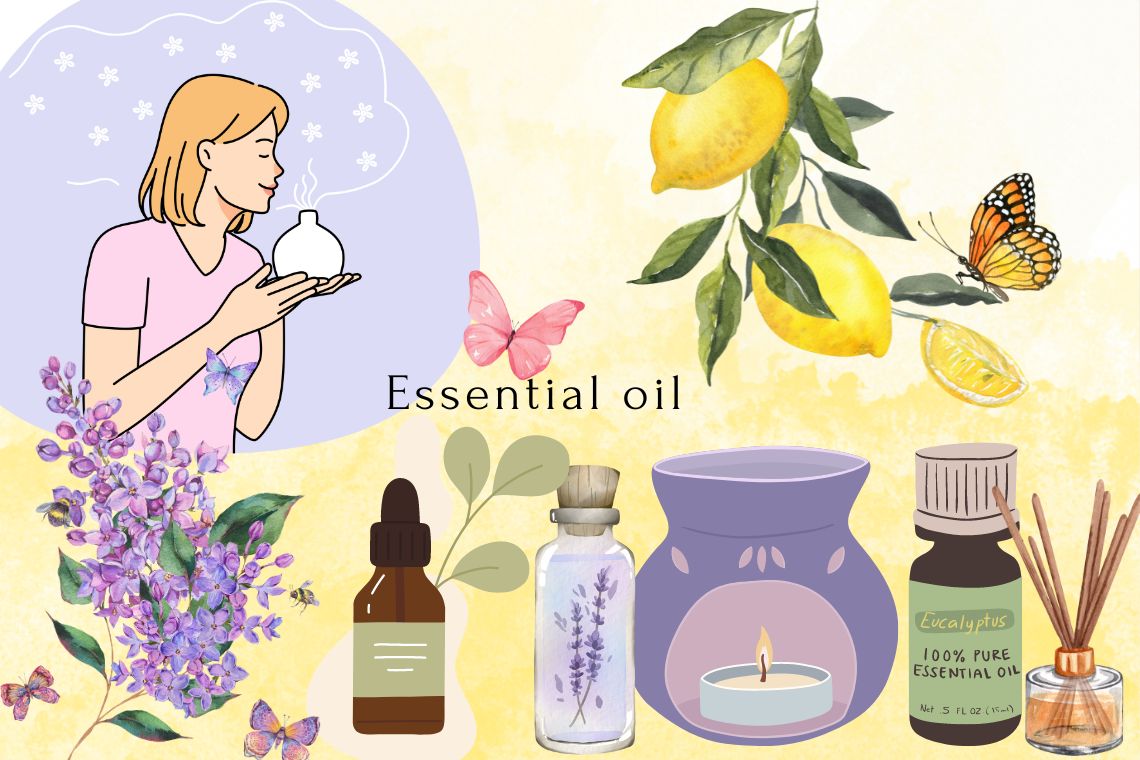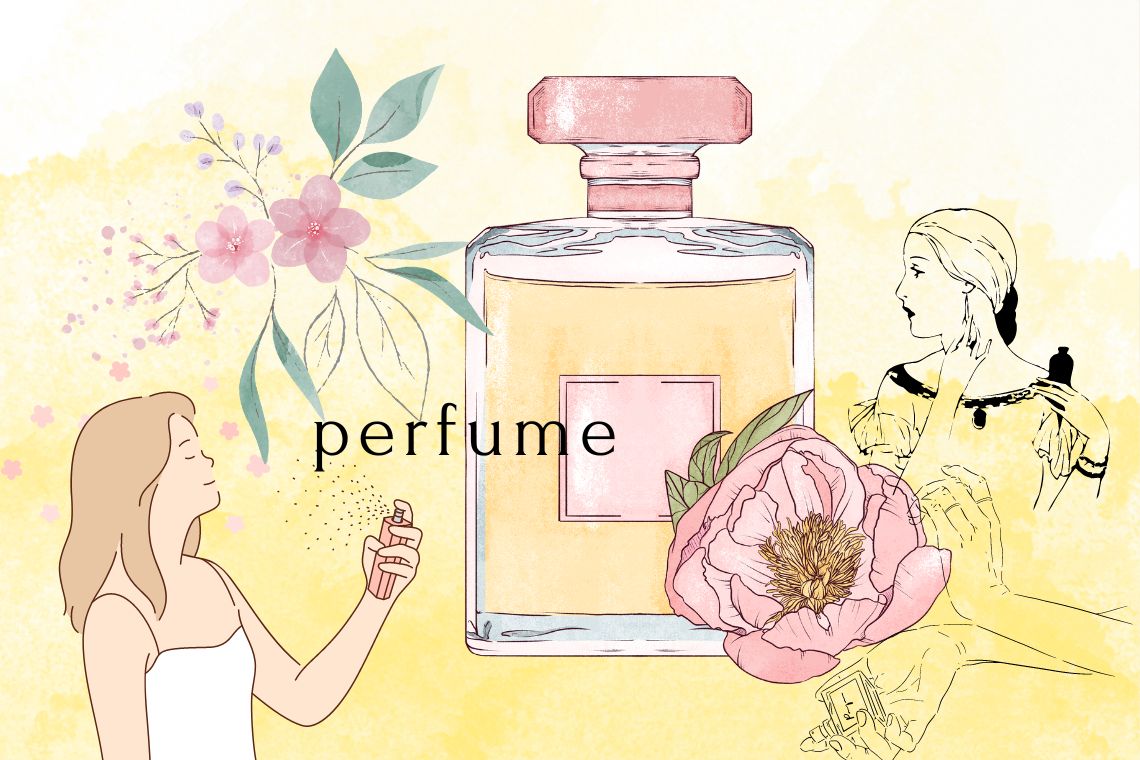Essential oil vs perfume

น้ำมันหอมระเหยต่างจากน้ำหอมอย่างไร?
น้ำมันหอมระเหย (Essential Oils) และ น้ำหอม (Perfume) เป็นผลิตภัณฑ์ที่มีกลิ่นหอมเหมือนกัน แต่มีความแตกต่างกันอย่างมากในด้านองค์ประกอบ ประโยชน์ และการใช้งาน การรู้จักความแตกต่างระหว่างน้ำมันหอมระเหยและน้ำหอมสามารถช่วยให้คุณเลือกใช้ผลิตภัณฑ์ที่เหมาะสมกับความต้องการของคุณได้ นี่คือความแตกต่างหลักระหว่างน้ำมันหอมระเหยและน้ำหอม

1. แหล่งที่มาและกระบวนการผลิต
น้ำมันหอมระเหย: เป็นสารสกัดจากพืชธรรมชาติ โดยใช้กระบวนการที่เรียกว่า การกลั่นด้วยไอน้ำ (Steam Distillation) หรือ การสกัดเย็น (Cold Pressing) สารที่ได้จากพืชนี้มีความเข้มข้นสูงและบริสุทธิ์ ปราศจากการเติมสารเคมี น้ำมันหอมระเหยถูกใช้ในศาสตร์ของ Aromatherapy เพื่อบำบัดสุขภาพกายและจิตใจ

น้ำหอม: น้ำหอมผลิตจากสารเคมีสังเคราะห์ หรือบางครั้งอาจผสมกับน้ำมันหอมระเหยเพื่อให้ได้กลิ่นที่ต้องการ น้ำหอมมักประกอบด้วยแอลกอฮอล์เพื่อให้กลิ่นหอมกระจายไปในอากาศได้อย่างรวดเร็ว โดยมีจุดประสงค์หลักเพื่อให้กลิ่นติดทนนานและทำให้ผู้ใช้รู้สึกดี
2. ประโยชน์และการใช้งาน
น้ำมันหอมระเหย: นอกจากให้กลิ่นหอมแล้ว น้ำมันหอมระเหยยังมีคุณสมบัติในการบำบัดร่างกายและจิตใจ ตัวอย่างเช่น น้ำมันหอมระเหยลาเวนเดอร์ (Lavender Essential Oil) ช่วยให้ผ่อนคลายและส่งเสริมการนอนหลับ หรือ น้ำมันหอมระเหยเปปเปอร์มินต์ (Peppermint Essential Oil) ที่ช่วยกระตุ้นพลังงานและบรรเทาอาการปวดหัว นอกจากนี้ น้ำมันหอมระเหยยังใช้ในการดูแลผิว เสริมสร้างสุขภาพ และช่วยปรับสมดุลอารมณ์
น้ำหอม: น้ำหอมถูกออกแบบมาเพื่อสร้างกลิ่นที่น่าดึงดูดและติดทนนาน ประโยชน์หลักของน้ำหอมคือการทำให้ผู้ใช้มีกลิ่นหอมตลอดวัน โดยไม่มีคุณสมบัติในการบำบัดหรือส่งเสริมสุขภาพเหมือนกับน้ำมันหอมระเหย น้ำหอมส่วนใหญ่ใช้ในรูปแบบของน้ำหอมพ่น หรือโรลออนเพื่อความสะดวกในการพกพา
3. ผลกระทบต่อสุขภาพ
น้ำมันหอมระเหย: น้ำมันหอมระเหยเป็นผลิตภัณฑ์จากธรรมชาติที่มีความปลอดภัยสูง เมื่อใช้ในปริมาณที่เหมาะสม น้ำมันหอมระเหยมีคุณสมบัติบำบัดหลากหลาย เช่น ลดความเครียด ส่งเสริมการนอนหลับ ปรับสมดุลอารมณ์ และช่วยฟื้นฟูสุขภาพทางกายและจิตใจ แต่ต้องระมัดระวังในการใช้น้ำมันหอมระเหยบริสุทธิ์ลงบนผิวโดยตรง ควรผสมกับน้ำมันพื้นฐานก่อนการใช้งาน
น้ำหอม: เนื่องจากน้ำหอมมักมีส่วนประกอบของสารเคมีและแอลกอฮอล์ บางครั้งอาจทำให้เกิดการระคายเคืองต่อผิวหนังหรือมีผลข้างเคียงสำหรับผู้ที่มีผิวแพ้ง่าย นอกจากนี้ การสูดดมน้ำหอมในปริมาณมากเป็นเวลานานอาจทำให้เกิดอาการแพ้หรือปวดหัวได้
4. ความติดทนของกลิ่น
น้ำมันหอมระเหย: กลิ่นของน้ำมันหอมระเหยมักจะคงอยู่ในระยะเวลาสั้นๆ เพราะไม่มีสารเคมีที่ช่วยยืดอายุของกลิ่น กลิ่นจะจางหายไปเร็วกว่าเมื่อเทียบกับน้ำหอม
น้ำหอม: น้ำหอมออกแบบมาเพื่อให้กลิ่นติดทนนานหลายชั่วโมง โดยเฉพาะน้ำหอมที่มีความเข้มข้นสูง (เช่น Eau de Parfum หรือ Parfum)
5. ราคาและคุณค่า
น้ำมันหอมระเหย: น้ำมันหอมระเหยคุณภาพสูงอาจมีราคาสูงกว่าเนื่องจากกระบวนการสกัดที่ซับซ้อนและความบริสุทธิ์ของผลิตภัณฑ์ อย่างไรก็ตาม น้ำมันหอมระเหยมีคุณสมบัติทางการบำบัดที่ไม่สามารถหาได้จากน้ำหอม ทำให้มีคุณค่าในด้านการดูแลสุขภาพ
น้ำหอม: ราคาของน้ำหอมอาจแตกต่างกันตามแบรนด์ ความเข้มข้น และส่วนประกอบที่ใช้ แต่ราคาน้ำหอมจะขึ้นอยู่กับการตลาดและการออกแบบกลิ่นมากกว่าคุณสมบัติในการบำบัด
สรุป
น้ำมันหอมระเหยและน้ำหอมมีความแตกต่างกันอย่างมากทั้งในด้านแหล่งที่มา การผลิต การใช้งาน และผลกระทบต่อสุขภาพ น้ำมันหอมระเหย เป็นสารสกัดจากธรรมชาติที่มีคุณสมบัติในการบำบัดและส่งเสริมสุขภาพ ในขณะที่ น้ำหอม เป็นผลิตภัณฑ์ที่สร้างกลิ่นหอมเพื่อเสริมบุคลิกภาพและความมั่นใจ การเลือกใช้ผลิตภัณฑ์ใดขึ้นอยู่กับความต้องการของคุณ ไม่ว่าจะเป็นการบำบัดร่างกายและจิตใจ หรือต้องการเพียงกลิ่นหอมที่ติดทนนาน
Essential Oil vs Perfume: Whats the Difference?
Both essential oils and perfume offer pleasant aromas, but they differ significantly in terms of ingredients, purpose, benefits, and how they affect the body and mind. Understanding these differences can help you choose the right product for your needs. Heres a detailed comparison:
1. Source & Production Process
Essential Oils
Derived from natural plant materialssuch as flowers, leaves, bark, roots, and seedsthrough methods like steam distillation or cold pressing. These oils are pure, highly concentrated, and free from synthetic additives. Essential oils are widely used in aromatherapy to support physical and emotional well-being.
Perfume
Typically made from synthetic fragrances, sometimes blended with essential oils. Perfumes often contain alcohol to help diffuse the scent into the air quickly. Their primary purpose is to provide long-lasting fragrance and enhance the wearers mood or personality.
2. Benefits & Usage
Essential Oils
Beyond fragrance, essential oils have therapeutic properties. For example:
Lavender oil promotes relaxation and improves sleep.
Peppermint oil boosts energy and relieves headaches.
They can also be used for skincare, immune support, and emotional balance. Common applications include inhalation, massage, or topical use (diluted).
Perfume
Perfumes are designed purely for aesthetic enjoymentto make the wearer smell attractive and feel confident. They are usually applied as sprays or roll-ons and do not offer healing or health-related benefits like essential oils do.
3. Health Effects
Essential Oils
When used correctly and in moderation, essential oils are generally safe and natural. They offer a wide range of healing effects, from stress relief to emotional regulation. However, pure oils should be diluted with a carrier oil before applying to the skin to prevent irritation.
Perfume
Since perfumes often contain synthetic chemicals and alcohol, they may cause skin irritation, allergic reactions, or headachesespecially for those with sensitive skin or fragrance sensitivity. Prolonged inhalation of strong perfumes may also trigger discomfort.
4. Longevity of Scent
Essential Oils
Tend to evaporate quickly, especially since they dont contain fixatives or synthetic stabilizers. Their scent is usually subtle and short-lived.
Perfume
Formulated to be long-lasting, especially high-concentration types like Eau de Parfum or Parfum, which can linger for several hours or even all day.
5. Cost & Value
Essential Oils
High-quality essential oils can be more expensive due to the complex extraction process and purity. However, their therapeutic benefits make them a valuable investment for health and wellness.
Perfume
Perfume prices vary widely depending on the brand, concentration, and packaging. The cost often reflects marketing and design, rather than health value.
In Summary
Essential Oils are natural plant extracts with therapeutic benefits used in aromatherapy to support health and well-being.
Perfumes are fragrance products designed to enhance personal scent and confidence, but typically lack healing properties.
Choosing between the two depends on your intention:
Do you seek emotional and physical healing through scent? Choose essential oils.
Want a long-lasting fragrance to enhance your presence? Opt for perfume.
